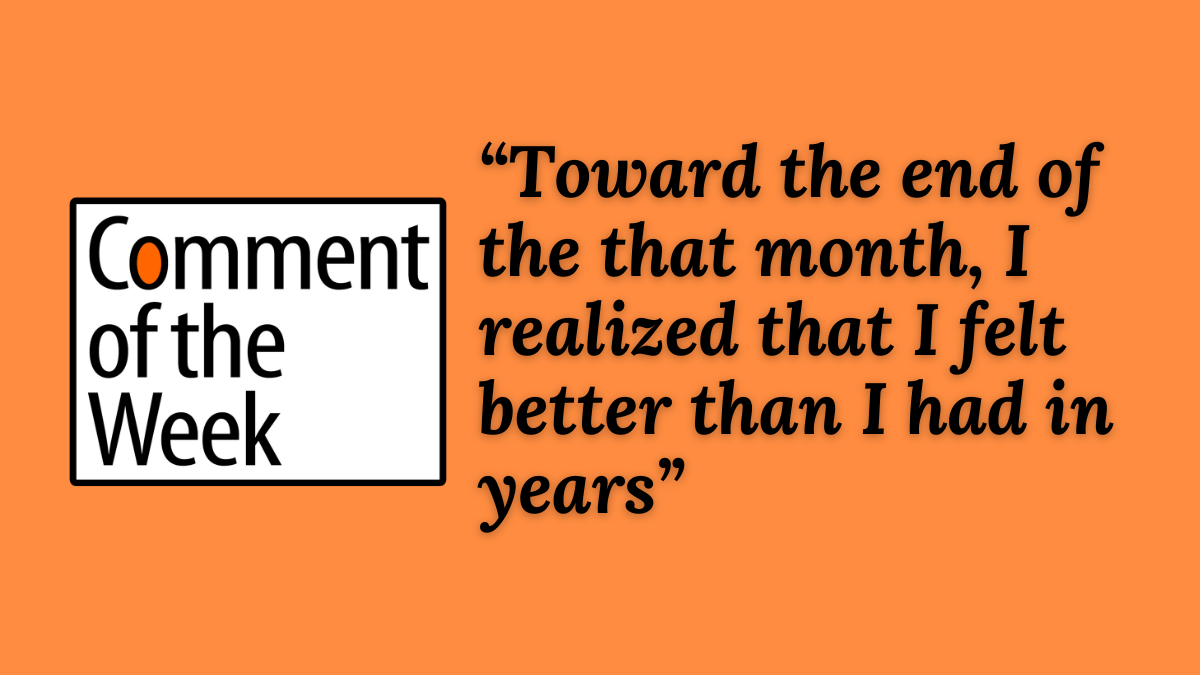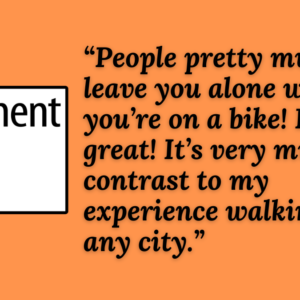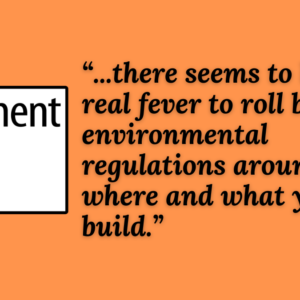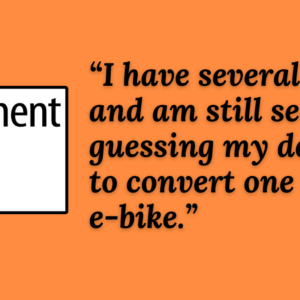
This week, reader “dw” wrote a comment which, as someone pointed out, was “nearly a guest BP article.” That’s true, and it was also an inspiring story.
Writing in response to our post about how Oregon has chosen to spend its $197 million in federal climate change funds on cars, dw talked about how riding a bicycle, and then an e-bike, ushered in a set of needed lifestyle changes which had always seemed out of reach.
Cycles of dieting, exercise — those strategies never stuck. But then dw bought a $100 bike, and here’s what happened next:
I also have a $3000 “luxury” ebike”, as my coworkers like to joke, that I spend about $200 a year on maintenance for. I’ve had mine for a little over 2 years and have put 10,000 miles on it.
I had a set of recurring mental and physical health issues that basically all boiled down to “lifestyle changes” for treatment. I went through cycles (no pun intended) of getting my diet under control, failing to get any exercise, feeling terrible physically, falling into a depression spiral, then letting the diet go because I felt like none of it really mattered so I might as well have Oreos for breakfast, lunch, and dinner.After not riding a bike since I was a kid, I ended up buying a used craigslist bike from some guy in Tigard for like $100 just because people riding bikes around my neighborhood looked like they were having a pretty good time. It hadn’t occurred to me that a bike could be a useful tool for transportation until I realized I could ride to Freddies in 10 minutes. I still drove to work, but basically every day for a month before/after work I was out riding to get all my errands done; riding to the grocery store, the barber, my favorite coffee place, the post office with a jank package-carrying setup on my no-rack 70’s road bike.
Toward the end of the that month I realized that I felt better than I had in years – and I made the connection that the bike was tricking me into getting exercise without having to “fit” it into my day.
The ebike has taken my radius of what I can accomplish – including commuting to and from work – and expanded it by several times. I still sometimes ride my analog bike to work, but anything above 65 degrees has me showing up to work a wet, sweaty mess to work. So I like that I can get some movement in my day without sweating like a hog. I can also cycle in my civilian clothes. I can carry tons of stuff up hills no problem. It really has replaced about 99% of my car trips. The only reason I still have my lil 08 fit is because it’s paid off and the registration + insurance is cheaper than what I’d pay for a rental whenever I drive. If/when it craps out I probably won’t buy another car.
I think ebikes open up utility cycling to an even wider range of body types, fitness levels, and lifestyles. As a public health intervention, I can’t think of a better way to get people moving than to make it fun, useful, and something they already do. Aka getting around.
I’ll end with a repetition of Lois’ point: Why in the (rapidly overheating) world are we NOT making this a no-cost/low-cost option for more people?
Thank you dw. You can read dw’s comment, along with many other strong comments, under the original post.







Thanks for reading.
BikePortland has served this community with independent community journalism since 2005. We rely on subscriptions from readers like you to survive. Your financial support is vital in keeping this valuable resource alive and well.
Please subscribe today to strengthen and expand our work.
From someone who is a curmudgeon about e-bikes, mostly b’cuz what I mostly see around town are very expensive bikes being rode around town by people who probably have 2 very expensive SUVs at home, this is a beautiful & inspiring story.
Although, if I’m being honest I also do see some folks who probably spent their Covid-19 pandemic stimulus check on their e-bike.
I love my ol’ skool pedal bikes & I probably always will. I’m sure I’ll slow down over the years & my range will get smaller, but so long as I’m able, I’ll go find a hill to struggle up so I can coast down the other side & say ‘WHEEEE!” a. big toothless ear to ear grin all the way down.
The development and mass-production of e-bikes is one of the most transformative technologic advances of our time. It could unlock massive shifts in the way people live and travel that would substantially reduce planet cooking gases. Is it largely overlooked because it is such an obvious solution?
Not sure if this is sarcastic or not, but e-bikes seem unlikely to transform much of anything. There are a lot of them out there now, and what, precisely, is changing?
100% sincere.
Sincerely,
Sir Sincerity
it is still early days, but ebikes help people choose not to drive.
Ebikes could even help people choose more trips and even make new trips!
Just like people now choose to wear a seat belt or not smoke cigarettes in certain areas, people change their habits when it benefits themselves. Govt can provide incentives to change behavior and govt needs to continue to provide the infrastructure, encouragement and prioritization. When people have to spend their own money as well to buy an ebike, they aren’t gonna let it sit in the garage, they are going to get out and ride. To me, a cargo ebike is freedom. Freedom to go to the grocery store, to give people rides, to move households, to do everything I want to do.
E-bikes have been around for decades, and common for years, while m-bikes have been available in numerous form factors for over 100 years. What is changing now to give them widespread appeal, to the extent that a meaningful number of people will change their behavior to use them?
Though I am skeptical, I would be easily convinced by some actual data that showed e-bikes reduce auto trips. That no one has been able to demonstrate it’s happening doesn’t mean it’s not, but it does suggest the phenomenon is not currently widespread. Maybe that will change?
But either way, I’m happy you love your cargo ebike. I love riding too!
PS: The statement “When people have to spend their own money as well to buy an ebike, they aren’t gonna let it sit in the garage” is demonstrably false. Many, many, many people buy expensive things they are excited about only to have them languish unused. This is especially true of sporting and exercize equipment, including bikes.
The more models and more presence of ebikes — and I mean pedal assist, not those throttle monsters — the more folks we can convert from automobile to bike commuters. I was fine bike commuting for 20 years, until along came a job that was just too far for me to commute by bike, and for which public transit — on its own or in combo with analog bike — was impossible. So, ebike purchased. I’m going to lead a workshop next month for my “bike-commute-curious” colleagues. If I can get 5 of them to stop driving and bike instead, that will be great. And then in a year if each of them gets another 5 … This alone won’t end the climate crisis, but it’s a helluva lot better than electric or standard cars/SUVs/minivans/trucks, which is what most of my colleagues use to commute.
Watts,
While ebikes have been around for decades (I would argue, not that many decades, maybe two…) there have not been the range and variety of bike types that are available now. Those are critical factors.
For instance, my 2013 ebike has a range of 25 miles and cannot haul much of a load and my 2018 ebike has a range of 95 miles and can haul 100 lbs of cargo. That is a huge difference in range and carrying capacity (which increases functionality significantly) in 5 years time. And now there are many more different model types now, they continue to advance.
Do you think that there are a lot of people who would switch to an e-bike, but are held back by the old 25 mile range? I’m willing to bet that the number of people interested in regularly biking over 10 miles each direction is relatively small. Likewise for hauling a big load of cargo.
For something to be “transformative” it needs to be adopted widely and change behavior. I’m just not seeing tons of people taking up riding in place of driving.
e-bikes, by themselves, are not going to create massive shifts. We need dozens and dozens of solutions. People are wild and crazy and unique. What works for one, isn’t going to work for another. What I would hate to see is if invention of new ways stopped just because the latest fad is “transformative”.
The basic puzzle of moving modern people and things at minimal environmental cost has been solved by e-bikes. The ability to restructure cities and villages has been unlocked by e-bikes. If policy makers, elected officials and sustainability advocates could come together over the obvious potential of e-bikes and agree that this is broccoli that we should eat, it would create a profound decrease in transportation-associated climate destruction.
E-bike adoption would be much more effective than schemes touted by profiteers; electrifying 2- 4.5 ton SOVs, carbon offsets, nuclear energy, carbon capture schemes, colonizing Mars, fracking or whatever.
Correcting our course away from ecologic collapse isn’t going to just happen by consumer choice or a fairy tale market-place invisible hand. This is evident from some of the comments making the argument that interventions will not be successful until they have already been successful.
E-bikes are being overlooked by the people who should not be overlooking them!
the concepts of expanding your useful radius while wearing normal clothes, carrying stuff and arriving fresh as a daisy are all spot on with ebike use. Also, they have a huge impact on the interested but concerned crowd which is where the biggest gains of cycling converts will likely come from, if there is a swelling of ridership. As an e-cargo bike user of about 3 years, i can easily it has cut our car use dramatically and this will likely continue into the future.
Yes, I have a few chronic illnesses that makes my energy levels quite unpredictable. I love my manual bike, but I always need to have a contingency plan (i.e., bus route) in case I suddenly feel a drop of energy level and couldn’t make the rest of the trip.
With all that, I almost never ride my bike on a time-sensitive trip (unless I plan to arrive much earlier), and not riding as often as I want to in general. E-bike would be a gamechanger for me, working on saving up for it & waiting for more details on the rebate program slated for 2025.
E-bikes improve accessibility to certain individuals. But that only matters for people who want to ride in first place — and few do. In any case, the range e-bikes have had for decades is more than sufficient for the vast majority of people, and they bring very little that small motorcycles and scooters haven’t always brought.
Why would someone who would drive less than a mile (virtually everyone) switch to an e-bike? Except if someone lives on a steep hill, anyone who can handle the e-bike can also handle a regular bike (or walk)
What is true is that the percentage of e-bikes relative to non e-bikes has exploded. But the total number of bikes of any kind seems to keep falling no matter where I am. Take yesterday for example when the weather was perfect. BN was virtually empty at rus, no cyclists at all encountered on Interstate. Usage of supposedly critical cycling infrastructure is light even at rush and virtually nonexistent off hours.
This issue of sweatiness keeps coming up, but most of our year is cool/cold — and wet. And dark.
Regarding non e-bikes, I propose we lose terms like “analog” and “acoustic.” These words are meaningless outside a tiny subset of bike advocacy and only help further other a group that has always had a problem with being othered.
I propose the term “real bike” — what is meant will be self-evident to everyone.
And if we want to convince more people to ride, a central message other than “Cars suck, drivers suck, cycling is scary and dangerous, but it’s good for the environment” might be more effective
Can’t we just call it a non e-bike or bike without batteries. Real bike has the same off putting sentiment as analog bike. First time I heard it, it was from a wealthy tech bro and I was like, oh brother…
I’m not disagreeing with your points but I wanted to point out some assumptions you’re making that are incorrect.
Many people are not physically fit and will get sweaty biking when it’s cold outside. If fact, I’d argue that’s more inconvenient to get sweaty when it’s cold because of being wrapped in layers or rain gear and unable to air out upon arrival. And certainly for mile long trips “anyone who can handle the e-bike can also handle a regular bike” except for steep hills is not true.
It sounds like you’re a fit, active man who doesn’t understand there are many people for whom a 1 mile bike ride on a gradual incline would be a workout and produce a sweat.
E-bikes solve this issue
Getting sweaty is affected by fitness, but it’s more affected by pacing and clothing.
There are many flat and flatish areas where an out of shape person can propel a bike with walking pace effort or even less. Overheating in light effort situations is a sign of simply wearing too much — the same as when they’re not on a bike.
For a one mile trip, it doesn’t take long whether you drive, ride fast, ride slow, or walk. While there are areas of Portland and individuals that isn’t true for, it’s generally true, and virtually all choose to drive.
E-bikes solve a problem few care about. I know a number of people who have what would be idea bike commutes for most people — short, great infrastructure on an easy path, and the traffic moves so slowly that it’s faster to ride at a slow pace before you deal with parking logistics.
My observation is people take cars because it’s a personal environment they enjoy (even when they’re stuck in traffic), and figuring out how to get around without driving is not an objective for them. That’s why they didn’t turn to e-bikes, scooters, or other options long ago.
The problems people raise are all solvable for most people. But those aren’t the real reasons people don’t ride. If that weren’t true, the other cycle commuters who are out there year after year wouldn’t be out there.